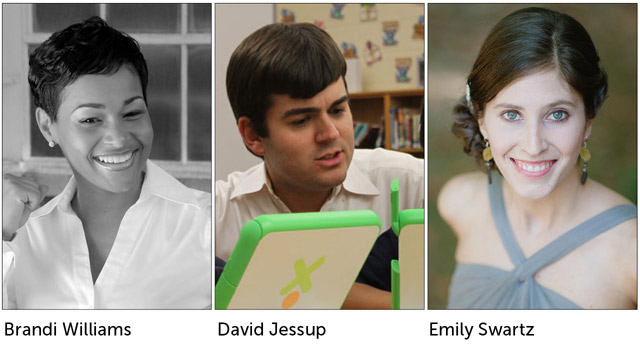
Using digital tools, literacy to reshape Charlotte
Inside a bright sunlit classroom, students hunch over their laptops. They’re laughing and smiling as they create an interactive story with images, sounds and text. One girl happily helps a friend take a digital photo of himself for the multimedia timeline. Charlotte At A Glance
Founded: 1768 City Population: 751,087 Regional Population: 2,442,564 Median Household Income: $48,670 Diversity Demographics
Caucasian/White: 50% African-American: 35% Hispanic: 13.1% Age Demographics
under 25: 35% 25-54: 49% 55+: 15.9% Knight active grants portfolio: 12 projects totaling $18,113,00
It’s a typical college scene. But this isn’t a college. It’s a second-grade classroom at Druid Hills Elementary School in Charlotte, N.C. The students are inventing their own digital version of Little Red Riding Hood. They’re seven years old.
The elementary school is one of nine in a West Charlotte initiative called Project L.I.F.T. The five-year, $55 million public-private initiative is designed to speed student progress in some of city’s lowest-performing schools. Knight Foundation announced $4 million in support last fall. Part of the foundation’s funding will provide laptops to all Kindergarten-through-fifth grade students in the Project L.I.F.T schools.
The students making themselves the heroes in Little Red Riding Hood — and the teachers who plan the lessons that turn computers into teaching tools — are the pioneers. Most of the 3,200 laptops will come in late February and “the excitement is contagious,” said One Laptop Per Child project manager David Jessup, who is overseeing their introduction.
The project is a key part of Knight’s strategy to improve Charlotte’s future by infusing access and engagement into a potentially transformative community initiative. The city has long viewed itself as a “New South” City. It takes great pride in being progressive and having residents working together. Knight’s grantmaking strategy reflects that. The foundation’s education projects connect with each other and the community at large. Technology is one of the pillars on which Project LIFT is built. Increasing digital skills and digital access helps students but also their parents. “The focus is on increasing resident collaboration and decision-making,” said Knight’s longtime Program Director in Charlotte, Susan Patterson. “Project LIFT is a community effort where collaboration already occurs, but ensuring families and residents in the area actively participate will be critical to its long-term success.”
One example: Knight’s Project L.I.F.T grant paid for two coordinators to work with the schools, nonprofits and directly with families and parents, helping the community become more involved in the education of its children. Coordinator Brandi Williams says this is crucial: “While there are barriers to getting parents and families engaged…we [meet] them where they are, build trust and help them define a path that is in line with their dreams and life mission.”Charlotte Leadership

Three Charlotte’s leaders share their paths to increasing student achievement
Full participation, whether on-line or offline, is often difficult for those living in low-income neighborhoods, like those in the LIFT zone. Charlotte is the largest city in North Carolina and its tremendous growth (from 2000-2010, the population increased by 65 percent) has led to the wider economic disparity common to urban America. This blocks access to the technology people need to be successful.
In the zip code around Druid Hills Academy, fewer than 20 percent of the homes have broadband. That’s one of the reasons Knight is involved in the national Connect2Compete program, with a goal to have “EveryoneOn” through low-cost Internet services, equipment and training. Connect2Compete comes to Charlotte this year. To help bridge the digital divide, qualifying families in the community will be eligible for Internet access for $9.95 a month, $150 laptops or desktops and free computer and technology training.
There’s also a focus on digital literacy skills at the Knight School of Communication at Queens University of Charlotte. Supported by a $5.75 million grant, its mission is to teach digital and media literacy not just to students but to the whole community, with classes, workshops and more. Last year, Knight School boot camps paired local Charlotte non-profits with students so that they could learn about social media. The school is forming partnerships with major institutions like the Charlotte Mecklenburg Library system, which served more than 3 million people last year.
The school also is launching a new website called Digital Charlotte to profile people, organizations and programs that help increase digital and media literacy. It will invite the community to add its own content, and features upcoming technology training events, including ones that teach blogging and using Twitter.
Using technology has also been a catalyst to fund the city’s cultural projects. Charlotte helped pioneer a new way of online giving when it launched Power2Give.org, a website that gives art lovers the chance to choose exactly how they want their money to be spent on projects. Since launching in 2011, the site – a project of the Arts and Science Council – has raised over $373,874. It is a sign of the city’s growing arts environment including cultural institutions like the Knight Theater, the Bechtler Museum of Modern Art, the Charlotte Symphony and the Mint Museum among others.
Like Little Red Riding herself, these Charlotte projects explore new and unfamiliar territory. No doubt the community will face challenges. But equipped with the right digital tools, its digital adventurers will find they can compete in the 21st century economy. And if the inspiring seven-year olds at Druid Hills Elementary School are any indication, it looks like they’re going to have fun along the way.
By Elizabeth R. Miller, communications associate at Knight Foundation
Recent Content
-
Artsarticle ·
-
Artsarticle ·
-
Artsarticle ·
